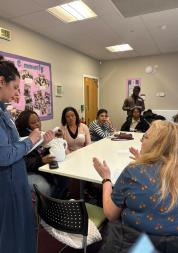“Why Me?”: Women’s views of cervical screening in Greenwich

Introduction:
The NHS Cervical Screening Programme invites women between the ages of 25 and 64 for regular cervical screening. In England, cervical screening prevents 70% of cervical cancer deaths (estimated). Improved screening uptake could result in more lives being saved.
Screening checks for a virus called high-risk HPV and cervical cell changes. It is not a test for cancer but aims to detect abnormalities within the cervix that could, if undetected and untreated, develop into cervical cancer. 99.8% of cervical cancer cases in the UK are caused by HPV infection and thus 99.8% of cervical cancer cases in the UK are preventable.
Aim of the study
To understand the views and experiences of cervical screening amongst non-attenders – i.e., women who had not attended for their cervical screening tests in Greenwich.
Want more information about cervical cancer screening?
Read our advice on what to expect during a smear test.
Methodology
Greenwich Public Health recruited women to take part in one of two focus group discussions at the end of November and early December 2022. Healthwatch Greenwich provided a facilitator and note-taker for each focus group.
Focus group discussions were held on two weekend mornings in community spaces in Greenwich. Discussions were recorded, with verbal consent from participants.
None of the women requested an interpreter or required communication assistance, and everyone participated in English.
A topic guide was used to steer the discussion and reveal experience and insight. The topic guide was divided into the following themes:
- Association - words/emotions associated with cervical screening
- Awareness of cervical screening and information sources
- Knowledge/assumptions about the screening procedure
- Challenges/barriers to cervical screening attendance
A total of nine women participated who each received a £30 voucher. Leaflets about cervical screening were made available and a representative from Greenwich Public Health was present to answer queries about the screening procedure at the end of the discussions.
There must be something wrong with me”. Why me? Why now? I don’t have any symptoms like itching or discharge
Waiting for the results is going to be stressful
How to encourage more women to attend for cervical screening
Based on our discussions in two focus groups, the following may encourage more women to get tested:
Communication: Receiving a phone call (rather than a letter or text) from a female member of staff telling them about their appointment, answering questions and encouraging them to attend.
Information about pain/discomfort: Women want open and frank disclosure about any pain or discomfort the procedure may cause and what they can be offered – or do themselves - do to minimise it.
Information about the procedure: Women want information on when and how the procedure is conducted, for example – when in the menstrual cycle it can and can’t it be done, who does it, the tools used, when they should expect results, and what choices they have – for example to have a chaperone with them, or to request a smaller speculum, and if it would affect virginity.
A female nurse or doctor conducting the procedure: There was an overwhelming consensus for having a female healthcare professional carry out the test and confirming with the patient that this would be the case. “A woman knows a woman’s body.”
Weekend and out of hours appointments: For some women, their place of work or education were outside the borough, making it difficult to accommodate the medical appointments during office hours in the week.
Downloads
If you would like this report in a different format, please email penny@healthwatchgreenwich.co.uk

